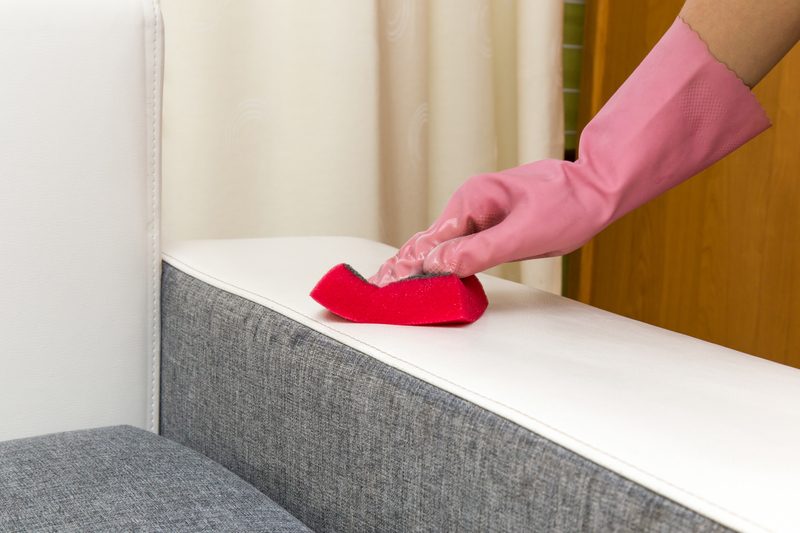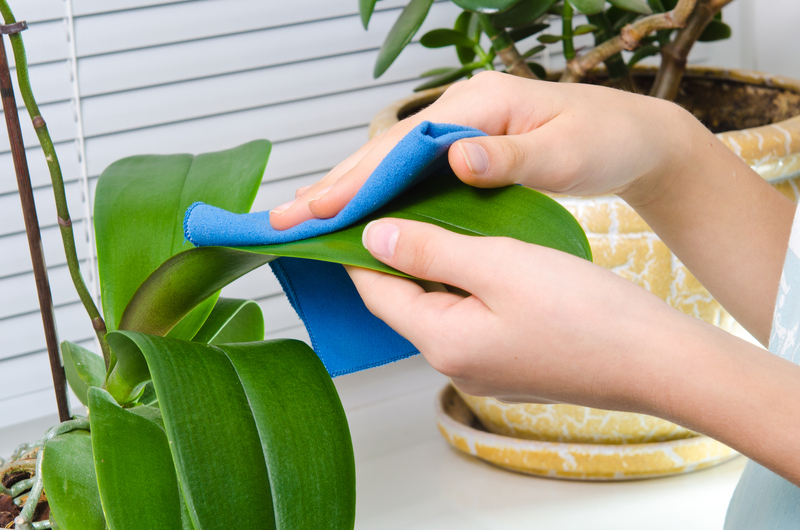Uncover the Magic of Jewellery Cleaning Methods
Posted on 19/08/2025
Uncover the Magic of Jewellery Cleaning Methods
Jewellery is more than just an accessory--it is a symbol of love, achievement, and cherished memories. Over time, however, your beloved pieces may lose their sparkle due to dirt, oils, and exposure to the elements. Fortunately, the magic of jewellery cleaning methods can restore their original brilliance! This guide will reveal a comprehensive selection of safe, effective, and professional techniques to transform your treasured items and ensure they dazzle for years to come.

Why Cleaning Your Jewellery Matters
- Preservation: Regular cleaning helps maintain the value and beauty of your items.
- Hygiene: Removing accumulated dirt and oils prevents skin irritation and infections.
- Brilliance: Sparkling pieces add a special radiance to your look and boost your confidence.
Understanding the proper jewellery cleaning methods ensures the long term health of your collection, regardless of whether you possess gold rings, silver necklaces, diamond earrings, or gemstone bracelets.
Essential Jewellery Cleaning Techniques
1. At-Home Jewellery Cleaning Methods
Many people are surprised to learn that effective jewellery maintenance doesn't always require a trip to the jeweller. Use these simple, cost-effective techniques to restore your jewellery's luster at home:
Soap and Water Method
- Mix a few drops of mild dish soap with lukewarm water in a bowl.
- Place the jewellery in the solution and let it soak for 15-20 minutes.
- Gently scrub with a soft toothbrush to remove grime from crevices.
- Rinse thoroughly with clean water and pat dry using a lint-free cloth.
Note: This classic jewellery cleaning technique is safe for gold, platinum, and even most gemstones, but avoid soaking porous stones like pearls or opals.
Baking Soda and Vinegar Method
- For silver jewellery, sprinkle baking soda over the item.
- Pour white vinegar onto the piece, creating a fizzy reaction.
- Let it bubble for a few minutes, then rinse and gently buff with a soft cloth.
This magical jewellery cleaning method eliminates tarnish from sterling silver, causing your pieces to gleam like new!
Professional Cleaning Solutions
- Commercial jewellery cleaners are specially formulated for safe yet powerful cleaning.
- Follow the manufacturer's instructions carefully to avoid damaging delicate pieces.
- These solutions often work well for gold, diamonds, and many gemstones.
Caution: Always check if your gemstones or settings are compatible with the cleaner. When in doubt, test a small section first.
Toothpaste for Jewellery Cleaning
- Apply a small dab of plain white toothpaste (not gel or whitening formulas) to a soft brush.
- Gently scrub the jewellery to lift dirt and polish the metal.
- Rinse thoroughly and polish dry with a soft cloth.
Important: Only use this method on hard stones and metals--avoid pearls, opals, and other porous gems to prevent damage.
Ultrasonic and Steam Cleaning: Advanced Jewellery Cleaning Methods
Understanding Ultrasonic Cleaners
- These devices use high-frequency sound waves to loosen and dislodge stubborn grime from intricate settings and crevices.
- Simply place your jewellery in the chamber filled with cleaning solution, switch the device on, and watch as invisible ultrasonic waves lift away dirt in minutes.
Ultrasonic jewellery cleaning is ideal for gold, platinum, and diamonds, but avoid using it on soft stones (like turquoise, pearls or emeralds), which may crack or chip under intense vibrations.
Professional Steam Cleaning
- Jewellers often rely on steam cleaning to banish built-up dirt and oil from jewellery without chemicals.
- Pressurized steam penetrates settings and removes the finest particles.
- It is especially effective for cleaning diamonds and hard gemstones.
Note: This method yields dazzling results but should be reserved for pieces without glue or delicate organic materials.
Jewellery Cleaning Methods for Specific Materials
Gold Cleaning Techniques
- Soak gold rings, chains, and bracelets in a mild soap and water mixture.
- For tough grime, use a soft brush and ensure thorough rinsing.
- Buff with a lint-free, non-abrasive cloth for a gleaming finish.
Avoid bleach, chlorine, and harsh chemicals--they will damage gold alloys and settings.
Silver Jewellery Cleaning Tricks
- Use a dedicated silver polish or the baking soda and vinegar method described above.
- Remove tarnish gently, as aggressive scrubbing can scratch the surface.
- Store pieces in anti-tarnish bags to prolong their shine.
Diamond Jewellery Cleaning Secrets
- Diamonds repel dirt, but settings can trap oil and dust.
- The soap and water method with a soft-bristled brush is safe and effective.
- For extra sparkle, consider professional steam or ultrasonic cleaning periodically.
Pearl Cleaning Steps
- Wipe pearls with a soft, damp cloth after each use to remove oils and perspiration.
- Occasionally, rinse in lukewarm water and dry flat with a gentle cloth.
- Nev er soak pearls or use detergents--they are highly sensitive to moisture and chemicals.
Store pearls separately to avoid contact with harder jewelry that might scratch their delicate surface.
Gemstone Jewellery Cleaning Advice
- Soft gems like opals, turquoise, or emeralds, require gentle care.
- Use only lukewarm water and a dab of mild soap.
- Rinse quickly and dry immediately to prevent water damage.
Tip: Double-check your gemstone's properties before attempting any cleaning.
Myths and Mistakes to Avoid With Jewellery Cleaning
Common Jewellery Cleaning Myths Debunked
- Myth: All jewellery can be safely cleaned with toothpaste. Truth: Toothpaste may scratch some metals and damage delicate stones like pearls.
- Myth: Bleach and household cleaners are safe for jewellery. Truth: These can ruin gems and corrode metals.
- Myth: Frequent cleaning always benefits jewellery. Truth: Over-cleaning fragile pieces, especially antiques, can weaken settings.
Major Mistakes to Avoid
- Never use harsh abrasives on soft or porous gems.
- Avoid ultrasonic and steam cleaning for glued or delicate items.
- Don't expose coloured gemstones to prolonged soaking or extreme temperatures.
- Always handle jewellery with care to avoid bending, scratching, or dislodging stones.
Jewellery Cleaning Tools and Accessories
- Soft-bristled toothbrushe: For detailed cleaning and gentle scrubbing.
- Lint-free cloths: For drying, buffing, and polishing without leaving residue.
- Commercial cleaners: Specially designed for specific jewellery materials and stones.
- Ultrasonic cleaning machine: For intricate, seasoned pieces.
- Jewellery polishing cloths: Embedded with micro-abrasives and cleaners, ideal for a finishing shine.
Equipping yourself with the right tools makes safe cleaning easier and more effective, reducing the risk of accidents.
How Often Should You Clean Your Jewellery?
- Everyday pieces (wedding rings, favourite chains): Once every two weeks for maintenance.
- Occasional items (pearl strands, gemstone earrings): Clean after each wear.
- Vintage or intricate jewellery: Consider professional cleaning once or twice a year.
Regular, gentle cleaning is preferable to infrequent deep cleans, as it keeps grime from accumulating and minimizes potential damage.
Professional vs. At-Home Jewellery Cleaning: Which Is Best?
Curious whether you should try DIY jewellery cleaning methods or trust an expert? Both options have advantages:
- At-home methods are economical for routine care, quick fixes, and non-delicate pieces.
- Professional cleaning is ideal for antique, high-value, or very delicate jewellery--ensuring every detail receives expert attention, and possible issues like loose stones are identified early.
It's wise to blend the two: maintain your jewellery at home, and schedule professional cleanings for optimal longevity and brilliance.
Jewellery Cleaning Do's and Don'ts
Do:
- Store jewellery separately to prevent scratching and tangling.
- Remove jewellery during strenuous activities or when handling chemicals.
- Check settings regularly for loose stones before cleaning.
- Use gentle cleaning agents and soft brushes.
- Dry thoroughly after cleaning to prevent water spots and corrosion.
Don't:
- Soak porous stones or pearls in water.
- Use abrasive materials like scouring pads.
- Mix different metals and stones while cleaning.
- Ignore professional help for antique or damaged items.
Precautions for Safe Jewellery Cleaning
Protect your investment by understanding the nuances of each piece in your collection. Always:
- Read care instructions from your jeweller or brand.
- Test a small hidden area first, especially with new cleaning solutions.
- Store diamonds and hard stones separately to avoid scratching softer pieces.
- Never use hot water on glued or treated gemstones as it weakens adhesives.
How to Maintain Shine Between Cleanings
- Wipe pieces with a microfiber cloth after each use to remove body oils and environmental residues.
- Apply a gentle buff to silver and gold items a few times per week.
- Keep jewellery in lined boxes or anti-tarnish pouches.
- Store items away from direct sunlight and moisture to prevent tarnish and discoloration.
Choosing the Right Jewellery Cleaning Method for You
Every piece of jewellery has its own care requirements--so before you embark on any cleaning, ask yourself:
- What is the metal and type of gemstone?
- Is the piece vintage or modern (setting strength)?
- Does it contain glue, enamel, or organic components?
- How often will it be worn or cleaned?
Matching the proper jewellery cleaning method to the item guarantees safe, long-term sparkle and structural integrity.

Frequently Asked Questions About Jewellery Cleaning
Can I clean all jewellery with soap and water?
No: While soap and water works for most pieces, it's not secure for pearls, opals, or porous gemstones--always check before cleaning.
How can I keep my diamond ring sparkling?
Routine gentle cleaning with mild soap and a soft brush keeps diamond rings brilliant. Avoid lotions, sprays, and settings with heavy residue buildup.
Should I use household cleaners?
Never use bleach, acetone, or abrasive cleaners on fine jewellery, as they may damage stones and metals.
When is professional cleaning necessary?
If your jewellery is vintage, valuable, or includes complex settings, a professional inspection and cleaning once or twice a year is recommended.
Conclusion: Unlock the Magic of Clean Jewellery
A sparkling piece of jewellery is timeless and magical, reflecting your personality and memories. By exploring these jewellery cleaning methods, you protect your treasures and keep them looking their best for generations. Whether you choose quick at-home solutions or expert cleanings, always tailor your strategy to each material and gemstone.
Remember: With knowledgeable care and the right techniques, you'll uncover the true brilliance and legacy of every ring, bracelet, necklace, and earring. Shine on with confidence--your jewellery deserves the very best!
Latest Posts
Is steam cleaning your leather sofa a good idea
Say Goodbye to Grime on Your uPVC Window Frames
Innovative Techniques for a Mold-Free Bathroom





